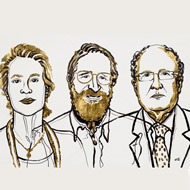
Three scientists share 2018 Nobel Prize in Chemistry
The Nobel Prize in Chemistry 2018 has been awarded to three scientists for their research into enzymes.
Frances H. Arnold from the California Institute of Technology will share the award with George P. Smith, University of Missouri, and Sir Gregory P Winter from the MRC Laboratory of Molecular Biology, Cambridge.
In 1993, Frances Arnold became the first person to use a technique called ‘directed evolution’ to create new enzymes. Since then, she has refined the methods that are now routinely used to develop new catalysts.
The use of Frances Arnold’s enzymes include more environmentally friendly manufacturing of chemical substances and the production of renewable fuels.
George Smith received the award for developing a method known as phage display. This is where a bacteriophage - a virus that infects bacteria can be used to evolve new proteins. Sir Gregory Winter then used this method for the directed evolution of antibodies, with the aim of producing new pharmaceuticals.
The first pharmaceutical based on this method, adalimumab, was approved in 2002 and is used to treat rheumatoid arthritis, psoriasis and inflammatory bowel diseases. Phage display has since produced pharmaceuticals that can neutralise toxins, counteract autoimmune diseases and cure metastatic cancer.
Professor Dame Carol Robinson, Royal Society of Chemistry president, said: “Today’s Nobel Prize in chemistry highlights the tremendous role of chemistry in contributing to many areas of our lives including pharmaceuticals, detergents, green catalysis and biofuels. It is a great advert for chemistry to have impact in so many areas.
“Directed evolution of enzymes and antibody technology are subjects that I have followed with keen interest; both are now transforming medicine. It would have been hard to predict the outcome of this research at the start – this speaks to the need for basic research.
“I am delighted to see these areas of chemistry recognised and congratulate all three Nobel Laureates.”
Illustration: Niklas Elmehed. Copyright: Nobel Media AB 2018



 The Veterinary Medicines Directorate (VMD) is inviting applications from veterinary students to attend a one-week extramural studies (EMS) placement in July 2026.
The Veterinary Medicines Directorate (VMD) is inviting applications from veterinary students to attend a one-week extramural studies (EMS) placement in July 2026.